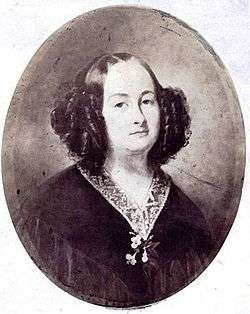Françoise, duchesse de Praslin
| Fanny, Duchess de Praslin | |
|---|---|
.jpg) | |
| Born |
Françoise Altarice Rosalba Sebastiani April 14, 1807 Constantinople |
| Died |
August 17, 1847 (aged 40) Paris, France |
| Cause of death | murder |
| Title | Duchess |
| Spouse(s) | Charles de Choiseul-Praslin 1824–1847 (her death) |
Francoise, Duchess de Choiseul-Praslin (April 14, 1807 - August 17, 1847) was a French duchess and heiress who was found murdered. Her husband, Duke Charles de Praslin was believed guilty for her death and committed suicide while awaiting trial days later on August 24, 1847. These events in 1847 contributed to the French Revolution of 1848.[1]
Biography
Her birth name was Françoise Altarice Rosalba Sébastiani. Her nickname was "Fanny". She was the daughter of Antoinette Jeanne (née Franquetot 1778–1807) and Horace Sébastiani (1771–1851), a French politician and army general. She was born in Constantinople where her father was stationed. Her mother died while giving birth to her. Her family was very wealthy and her father was a peer in Corsica.[2]
She married the Duke at age 17 in 1824 and had as many as 10 children with him, with many miscarriages. After going through several governesses for their children, they hired a woman named Henriette Deluzy. Deluzy spent six years with the family, and it was a public scandal when it was widely reported the Duke and Deluzy were lovers, which infuriated the Duchess. The Duchess fired Deluzy in June 1847, which sent their household into a tailspin. The Duchess felt she was being estranged from her children and her husband had lost interest in her. She was no longer thin and beautiful like she was when they first married when she was 17. She was now nearing 40 years old and was over-weight from her many childbirths. She threatened to divorce the Duke after he refused to fire Deluzy himself, which would mean that her families money would go with her, leaving him much less wealthy.[3]
It is generally believed that while the Duchess was sleeping her husband murdered her while she was visiting Paris. After Deluzy was fired, the Duke paid for her to have an apartment in Paris and he had been away staying with her. The Duchess had her throat slashed and then she was hit with blunt objects, leaving cuts and marks all over her body, until she was dead. This caused further scandal because her husband being a Duke meant that even though he was believed guilty, he was protected from being sentenced and jailed until other peers met and came to an agreement on the proceedings. While the Duke awaited what was likely to be a long prison sentence, he began poisoning himself with what is believed to be arsenic, and he died within six days of first appearing sick on August 24, 1847. He never confessed to his wife's murder. The governess, Henriette Deluzy, was also arrested because officials believed she could have been involved in the plot with the Duke to kill the Duchess. She was eventually cleared of any wrongdoing, and left France, immigrating to the United States. The younger children of the Duke and Duchess were split up and raised by family members.[4]
The death of the Duke and Duchess and the following controversy contributed to the start of the French Revolution of 1848. The couple were considered members of the royal court of the King Louis Philippe I and their scandals added to the public feeling that the King and his court were not trustworthy or honorable. King Louis was forced to abdicate the throne and he fled to England where he lived the rest of his life.
During this time period, the family owned Vaux-le-Vicomte, and also had a residence in Paris.

In popular culture
Writer Rachel Field, who claimed Henriette Deluzy was her great-aunt, wrote a novel about the events titled All This, And Heaven, Too, which was released in 1938. In 1940, a film was made of the same name All This, and Heaven Too, in which the Duchess was portrayed by actress Barbara O'Neil, with Bette Davis portraying Henriette Deluzy. O'Neil was nominated for the Academy Award for Best Supporting Actress for her performance as the Duchess, and the film was nominated for Best Picture of the Year.[5][6]
References
- ↑ The Praslin murder accessed 12-21-2015
- ↑ The Murder of the Duchess de Praslin
- ↑ The Great Pictorial History of Crime accessed 12-21-2015
- ↑ The murder of duchess de praslin accessed 12-21-2015
- ↑ Woman Films of the 1940s accessed 12-20-2015
- ↑ All This and Heaven Too accessed 12-21-2015